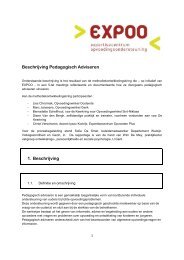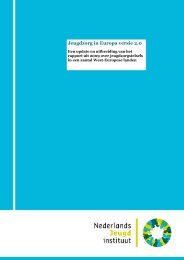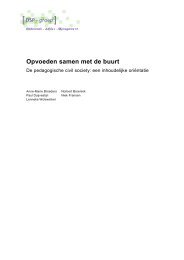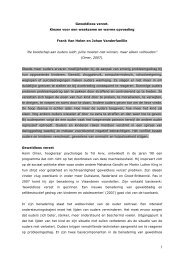Technique Is Not Enough (TINE) - British Psychological Society
Technique Is Not Enough (TINE) - British Psychological Society
Technique Is Not Enough (TINE) - British Psychological Society
- No tags were found...
You also want an ePaper? Increase the reach of your titles
YUMPU automatically turns print PDFs into web optimized ePapers that Google loves.
alienation and sense of isolation from the mainstream experienced by the rioters and theirfamilies; social exclusion by other names. The economic downturn and increasingunemployment, particularly among women, is likely to result in some families on the cuspwho are just managing to get by, falling into difficulties. Cuts to public services are likely toresult in the reduction of the kind of informal support offered by Children’s Centres andother community-based facilities. The capacity of these services to respond to increasingdemand will be stretched. All the more reason that the messages in this paper about howto provide evidence based programmes more effectively is time critical.The arguments set forth in this paper suggest that programmes will only reach thesetroubled families if they speak to their needs and their concerns. What is needed is noteither/or, but both/and. While it is critically important to use programmes that are known tobe effective, it is also crucial that such programmes are nuanced to local communitycircumstances. I particularly welcome in the paper the attention to the practical barriersthat many families face when asked to participate: transport, childcare, provision of foodand refreshments. I have often suggested that uptake of such programmes would skyrocketif the weekly sessions were held in a venue with free laundry facilities. A deepunderstanding of the constraints and pressures on the lives of families is required for realengagement. Real engagement and understanding needs to be matched with challengingthose behaviours and practices in families that are known to be harmful to child well-being.The attention to detail and co-production of the programmes described in this paper seemto accomplish both of these aims: understanding the context while pushing for change.I have two concerns with the propositions in this paper. The first is the very high level ofskill that is needed by providers of programmes to maintain programme integrity whilemoderating to local need. My experience is that moderating to local need can sometimesmean changing things to suit local staff and what kinds of activities they enjoy, rather thantheir abilities to really work with potential users to identify what they think would helpthem. My second concern, which is addressed, is the need to constantly monitor impact.Did we do the right thing but not quite well enough, or was the basic premise wrong?Ongoing monitoring of participation and then evaluating medium- to longer-term impactis always challenging and rarely properly funded. I am convinced that using some of theframeworks and techniques for engaging socially excluded groups described in this paperwill work. Believing the argument is not enough, demonstrating the validity will beessential.Naomi Eisenstadt CBSenior Research Fellow at Oxford University, former Chief Advisor to the Secretary of State forEducation on Children’s Services and Director of the Social Exclusion Taskforce.May 20126 Professional Practice Board
















